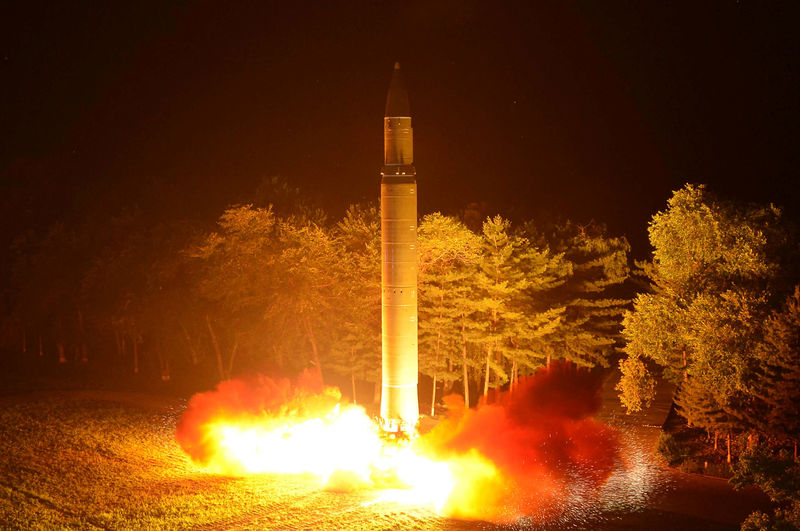By Matt Spetalnick and David Brunnstrom
WASHINGTON (Reuters) - With no palatable military options, U.S. President Donald Trump may ultimately have no choice but to give diplomacy a chance to end the crisis over North Korea's nuclear and missile programs.
For now, though, he is pursuing tougher economic sanctions, including an oil embargo, and opposed to making any concessions that might look like appeasement, insisting that more pressure on the regime of North Korean leader Kim Jong Un is needed before it is time to talk.
North Korea seems even more opposed to negotiations until it has achieved the ability to attack the continental United States with nuclear weapons.
"North Korea is not interested in dialogue. ... Kim Jong Un has sent a message with this last test that he doesn't listen to anybody," said a senior official who helps coordinate the European Union's North Korea policy.
So for now, despite calls from Russia, China, and others, there is no push from the United States or North Korea for direct talks, despite an escalating crisis that threatens millions of lives after North Korea conducted its sixth and most powerful nuclear test last weekend.
The Trump administration says the United Nations needs to tighten economic sanctions to pressure North Korea to change its behavior and start talking. A draft sanctions resolution was circulated to the United Nations Security Council on Wednesday.
Trump's tactics, one senior administration official said on the condition of anonymity, mirror those in many of his business deals: simultaneously playing good cop and bad cop, not appearing too interested in making a deal but keeping lines of communication open.
Trump said on Wednesday after a call with Chinese leader Xi Jinping that military action against North Korea was not a first choice, "but we will see what happens."
Nikki Haley, the U.S. ambassador to the United Nations, said on Sunday that Kim was "begging for war," but added: "The time has come for us to exhaust all of our diplomatic means before it's too late."
The United States wants the Security Council to impose an oil embargo on North Korea, ban its exports of textiles and the hiring of North Korean laborers abroad and subject leader Kim Jong Un to an asset freeze and travel ban, according to a draft resolution seen by Reuters on Wednesday.
It was not immediately clear if the draft had the support of North Korean ally China, which along with Russia, while denouncing the latest test, has said that resolving the nuclear crisis is impossible with sanctions and pressure alone. [L4N1LN25F]
A decade of sanctions has not slowed North Korea's nuclear weapons program, and now that it is closer to its goal, diplomats and analysts say it is unlikely to back down.
ERRONEOUS ASSUMPTION
"The U.S. policy of strategic patience on North Korea has assumed that time is on their side - that economic sanctions will eventually lead to the collapse of Kim Jong Un's regime and its economy, and it will come to the negotiating table, no longer able to withstand the economic pain," said Moon Chung-in, a special adviser to South Korea's president on foreign affairs and national security.
"However, such an assumption has now proven wrong. North Korea's economy has not only adapted quickly to tightening sanctions, but the country has also succeeded in advancing its nuclear weapons programs despite more than a decade of economic hardship."
Zhao Tong, a Beijing-based North Korea expert at the Carnegie-Tsinghua Center, said Pyongyang may hope Washington ultimately will recognize it has developed a credible nuclear capability, abandon its long-standing precondition for talks - that North Korea accept that they be aimed at its nuclear disarmament - and instead seek the freezing its nuclear program.
"From the North Korean perspective, their strategy is working," he said.
Most experts say it no longer is realistic to think North Korea will trade away its nuclear arsenal in exchange for sanctions relief, economic support, or a peace treaty with the United States ending the formal state of war that has existed since the 1950-53 Korean War.
Robert Einhorn, a former senior U.S. non-proliferation specialist now at the Brookings Institution think tank in Washington, said North Korea has learned from the U.S. invasion of Iraq and the late Libyan leader Muammar Gaddafi's decision to stop developing weapons of mass destruction "that you can't give up critical assets that you need for your own survival."
China has put forth a "freeze-for-freeze" proposal that would suspend large-scale U.S. military exercises with South Korea in return for a suspension of North Korean nuclear and missile tests.
Washington continues to reject that idea.
But the longer diplomacy is delayed, the greater the chances that North Korea can master the ability to hit the U.S. mainland with nuclear-tipped missiles, and then enter talks from a position of strength.
South Korea is keeping open the option of dialogue with North Korea, and hopes Washington and Seoul can develop a diplomatic "roadmap," Cho Hyun, South Korea's second Vice Foreign Minister, said at a seminar in Washington on Tuesday.

"It may sound unrealistic today, but we cannot abandon it."